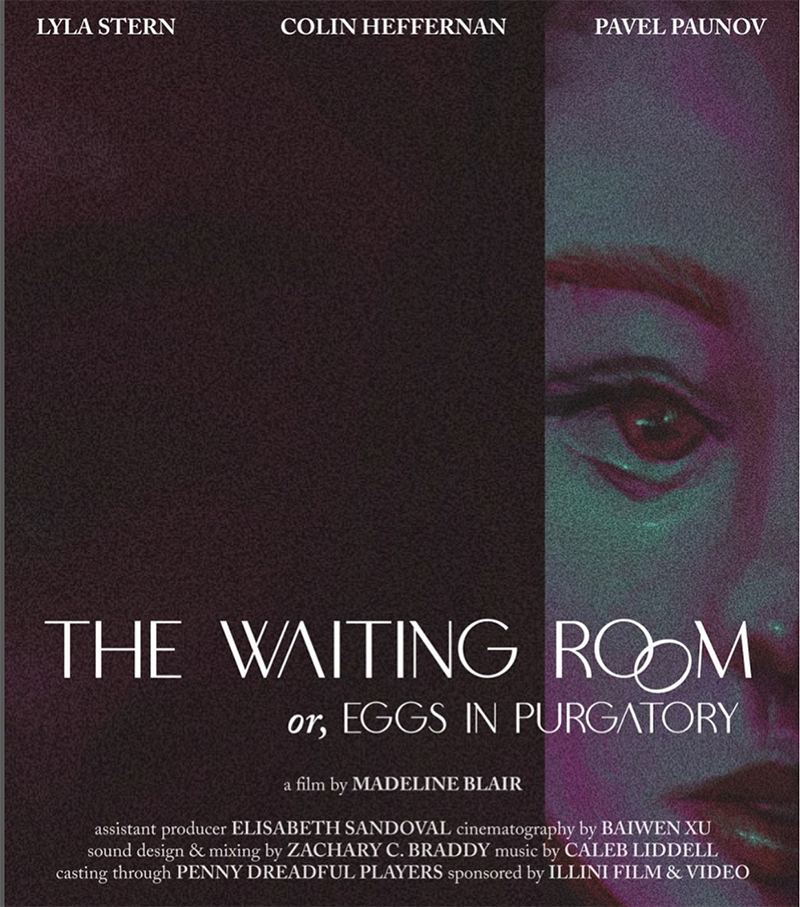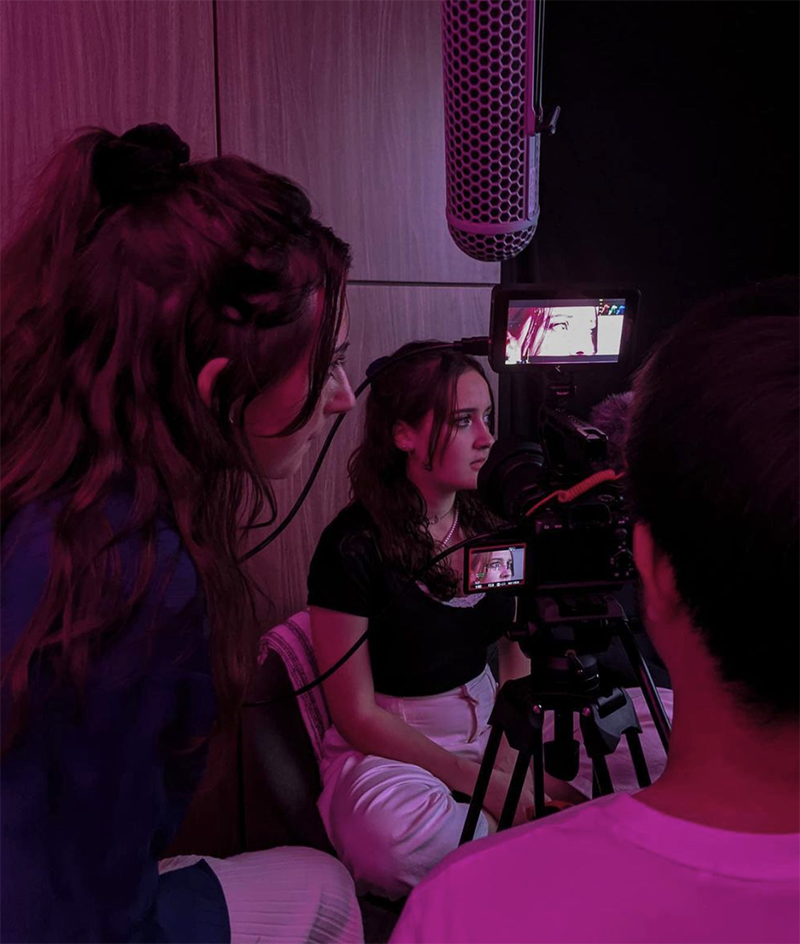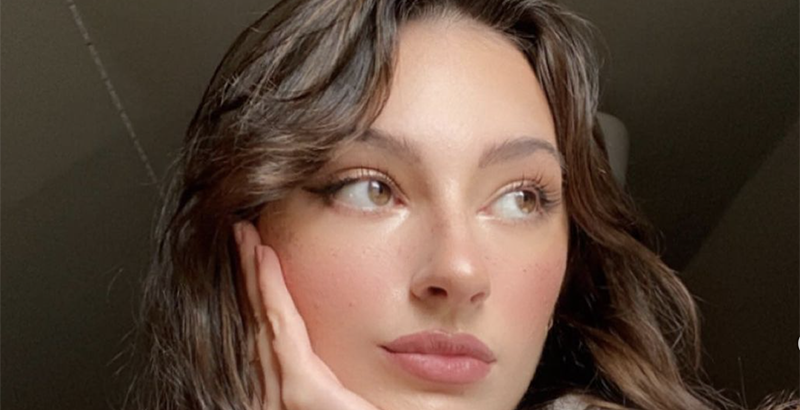U of I junior Madeline Udelhofen (known artistically as Madeline Blair) has been working on a script titled The Waiting Room, or Eggs in Purgatory since she was a senior in high school. Blair originally intended for her script to premiere onstage as part of the student group Penny Dreadful Players’ Ten-Minute Play Festival, but when that was canceled, she decided to adapt it for the screen as a short film. Acting as the film’s writer and director, Blair collaborated with both the Penny Dreadful Players and Illini Film and Video, as well as a PhD candidate in the School of Music composing the score. The Waiting Room, or Eggs in Purgatory is a campus-wide testament to the unifying power of art in the face of adversity, and while it is her very first foray into filmmaking, Blair is already looking forward to her next project.
Smile Politely: Just to get things started off, how long have you been working on The Waiting Room, or Eggs in Purgatory?
Madeline Blair: I wrote it during my senior year of high school as a play, and I’m a junior in college now. So I had this kind of sitting there for a really long time. I’ve been working on it as a short film since September. I’m the creative director of the theatre group Penny Dreadful Players, and The Waiting Room was originally going to be produced as part of our annual Ten-Minute Play Festival, but we had to cancel that because of COVID and some other reasons. After that, I just decided to not completely cancel my own show, and we went ahead with it as a film. In the process, the experience entirely changed, and we’re still working on editing now. There’s still a bit of music composition and color grading that we’re figuring out, but it’s in the very last stages. My goal was to finish filming by Thanksgiving, and it only ended up taking us the month of October to accomplish that, because, well, it’s a short film. It’s only about fifteen minutes. So we’ve been working on it for about four or five months.
SP: Was the decision to rework The Waiting Room as a short film something that happened immediately? Or did you spend some time thinking before you realized you wanted to keep it going?
Blair: The original plan with the Ten-Minute Play Festival wasn’t that we were going to perform them live because we would have had to wear masks inside university buildings. The casts and their directors would have gotten together and performed it like a play, but just filmed it. From the beginning, I personally didn’t want to do that for mine because it’s not very engaging for the audience like that. I had acted in some short films over the summer in Chicago, so I had a decent amount of knowledge about how to shoot a film. I knew that I wanted it to be more than just performing it like a play and then filming it. Once the Festival was canceled, we realized that we had a lot more time to actually make it good. Originally, we were only going to shoot for a day or two, and with what I wanted to do, that wasn’t going to work. Honestly, it was a good thing that the Festival was canceled, because I was able to do what I actually wanted with The Waiting Room. So I kind of went into this knowing that it was going to become a short film from the beginning, but it turned into something genuinely good once the Festival was canceled.
SP: What were some changes that you’ve had to make adapting The Waiting Room from stage to screen?
Blair: When you write a screenplay for a film, it goes through different drafts. You have the original draft, then you add in directions for camera angles and shots and it becomes a shooting draft. I never did that, so the script stayed more or less the same as it was when I wrote it as a play for my drama class final senior year of high school. Actually going in and drafting a storyboard was very difficult, because I was piecing together in my head how I wanted it to be done. I know that plays have been adapted into feature-length films before, and I know there are many plays that have been successful in Hollywood. This is my very first directorial experience, and my first time being the head of the ship creating a film, so I tried to do as much research as I could. I talked to the directors of short films that I had acted in, and I was able to work with Illini Film and Video to get a cinematographer, production assistants, and people to work on lighting and sound. [Working with] people who know what they’re doing with a camera and lighting and sound equipment was insanely helpful. Otherwise, I would have had to teach myself how to do everything, and I’m really glad I didn’t have to do that. It was still difficult, but I was surrounded by a crew of people who knew what they were doing, so I really just had to work on the creative aspect.

Photo from Madeline Blair’s Instagram.
SP: You mentioned collaborating with Illini Film and Video. What kind of help did you have from student groups and school resources?
Blair: Basically, as soon as The Waiting Room became a separate entity from the Ten-Minute Play Festival, I didn’t have any input from the rest of the board of Penny Dreadful Players. I had already cast it through Penny Dreadful Players because it was originally going to be done through the festival. I’m really thankful that the casting pool was so good, because we’re a pretty well-known theatre group on campus. So that was some initial help, I suppose, but in terms of the production process itself, it pretty much was just me pulling myself in like ninety different directions as producer and director. I actually have a cameo in the film, so I also acted in it for five seconds because one of my actors couldn’t show up one day and I had to fill in. I handled the film and video side of things, and in terms of music production and composition, I reached out to a bunch of people in the Illinois School of Music. I don’t personally know anyone there, but my friend Kat Williams does. She’s majoring in media and cinema studies, and she has ample experience making short films and things like that. I was talking to her about music for the film and she told me to reach out to the School of Music. When I did that, a PhD candidate named Caleb Liddell reached out to me and he said he had experience in composition and was interested in working me with.
SP: In other words, you don’t have to know how to do everything by yourself—you just need to know who can do what.
Blair: Yeah, and with me having so many roles to fulfill, it has been a big learning curve because everything is new to me. I keep reminding myself that after this is all said and done, I’m going to have a huge skillset of things I know how to do now, like directing, producing, editing, and scheduling. This work is hard at the moment, but it’ll be really helpful for future projects.
SP: That’s a good attitude to have with any kind of creative endeavor. From all the things you’ve done during this process, what is one thing that you have learned and will use in the future?
Blair: I think the most profound skill that I’ll be taking with me is being able to direct something that I’ve written. I’m directing another play that I wrote with Penny Dreadful Players now, so I’m not sure if I have the same passion for directing things that I haven’t written. This process has made me reconsider my future career path, because now I really want to get into filmmaking, and I have many plans to get more experience, especially while I have the resources I do in undergrad. I also really like casting, and as a director, you get to be a part of that process. Running auditions for my new play last week reminded me how much I loved casting The Waiting Room last semester.
SP: Are you planning on pursuing a career in filmmaking or changing your major?
Blair: I’m a creative writing major with a minor in French right now, but my focus was always on poetry (Smile Politely did a review of my recent collection, Halcyon.) Up until I directed this film, that is still what I had in mind. I took a couple of playwriting classes, and I’m now in a screenwriting course, but there’s not really a focus for playwriting or screenwriting in the creative writing major. Generally, it’s poetry or fiction, but it’s really reshaping what I want to do for grad school or just anything post-undergrad. It’s making me think about maybe film school after undergrad. It’s a little scary having almost your whole life path be changed by one thing that you’re really passionate about, and you have to do a lot more research about it to understand your options and pathways. I’m going to complete my major in creative writing because I like writing in a lot of different ways, and I think all of my different genres of writing impact each other.

Photo from Madeline Blair’s Instagram.
SP: Sounds like a good place to be in towards the end of your junior year. You mentioned influences like Wes Anderson, Greta Gerwig, and Ari Aster. Did any of them specifically influence the tone of The Waiting Room?
Blair: Yes, I would say Ari Aster the most. I have been a fan of his work for years, like his big films Hereditary and Midsommar, obviously. When I was doing research on how to do my own short film last year, I found he has a lot that he’s done in the past on YouTube, and I am friends with somebody who acted in one of them. I messaged him about it and he told me that they’ve known each other since college. It was a weird crossing of two worlds that someone I know is good friends with (Aster). When I sent my composer rough cuts, I included a Spotify playlist mood board to show the tone of music that I wanted for my film. Half of the songs were from the soundtracks of Hereditary and Midsommar. I think that the real human horror aspects of his work is resonant to me and something that I really like emulating. Of course, I also love Greta Gerwig, because she’s another woman writer-director, and I think those are somewhat rare in Hollywood. I definitely admire that, and hopefully I can be the same one day in the future. Wes Anderson’s attention to cohesion, world-building, and tone in his cinematography is so iconic. I like watching movies and focusing on every single aspect of a movie when I watch it.
SP: Has there been anything particularly challenging about the production process that you had to deal with?
Blair: This isn’t something that I’ve really spoken about before, but I’ve had really bad anxiety my whole life, especially during the pandemic. Just going out and attending classes last semester was really difficult, so I’d get pretty nervous having to do rehearsals most nights. We actually filmed in my apartment–I transformed my whole apartment into a set because there was no better place where we would have a couch and chairs—and sometimes we would film for up to eight hours at a time.
There were days when my blood sugar would get low and I’d get really anxious, but with everyone relying on me, I had to trust my cast and crew to get me through it. I’m really glad that I was able to push through that anxiety and get this done, because I really wanted to work on a tight schedule. It was difficult to get myself to do that, what with how rocky my mental health has been the past year-and-a-half, but I’m really glad that I did. I’m trying to just focus on the present and work on things [the way I want to] while I still can.
SP: That’s more important than ever right now. Is there anything you’d like readers to know about the film going in?
Blair: When I was writing it my senior year of high school, I would ask my drama teacher to give me the weirdest books that she had for inspiration, and she’d give me these super absurdist, experimental, off-the-wall books of scripts. The Waiting Room isn’t that crazy—it’s genuinely just a conversation between people, but there are aspects of it that take interesting and introspective turns. It begins as a dark comedy and turns into existentialist horror, because I wrote it at a time when I was having really bad depression. So I wrote this script as an allegory for that. It’s set in the waiting room between heaven, hell, and purgatory. I love drawing inspiration from film and plays, so it’s got inspiration from Heathers and Beetlejuice, and No Exit by Jean-Paul Sartre. These two characters are in the waiting room, and the one, Maya, is really tired of everything, and the more weary she gets throughout the movie, the more it devolves and spirals into horrible despair. There’s something that’s literally a physical representation of what I had been feeling a lot at the time, and it was almost a bit horrifying to see it come to life, but in a great way. My actors, Lyla and Pavel, are some of the most talented people I’ve ever met in my life, so seeing them take this weird, experimental, existentialist dread and run with it is really exciting. I’m excited for people to see it come to life and hopefully be able to see themselves in it, because I think it’s a pretty universal experience, especially nowadays. Hopefully, it’ll be a mind-boggling and thought-provoking experience.
Blair plans to send The Waiting Room to festivals and YouTube, and plans on an April release.
For more about The Waiting Room, Eggs in Purgatory, follow Madeline Blair on Instagram, or check out the film’s IMDb page.








